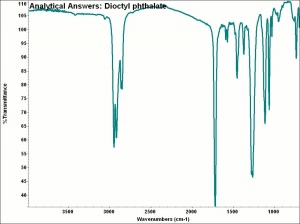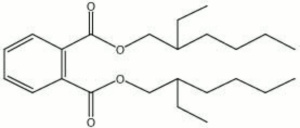Difference between revisions of "Dioctyl phthalate"
Jump to navigation
Jump to search
(username removed) |
(username removed) |
||
| Line 1: | Line 1: | ||
== Description == | == Description == | ||
| − | A light-color liquid commonly called bis(2-ethylhexyl)phthalate. Dioctyl phthalate is used as a [http://cameo.mfa.org/materials/fullrecord.asp?name=plasticizer plasticizer] in [http://cameo.mfa.org/materials/fullrecord.asp?name=cellulose | + | A light-color liquid commonly called bis(2-ethylhexyl)phthalate. Dioctyl phthalate is used as a [http://cameo.mfa.org/materials/fullrecord.asp?name=plasticizer plasticizer] in [http://cameo.mfa.org/materials/fullrecord.asp?name=cellulose%20acetate cellulose acetate], [http://cameo.mfa.org/materials/fullrecord.asp?name=cellulose%20acetate%20butyrate cellulose acetate butyrate], [http://cameo.mfa.org/materials/fullrecord.asp?name=polystyrene polystyrene], [http://cameo.mfa.org/materials/fullrecord.asp?name=polyvinyl%20chloride vinyl chloride], and [http://cameo.mfa.org/materials/fullrecord.asp?name=polyvinyl%20chloride%20acetate vinyl chloride acetate] polymers. Polymers may contain DOP in concentrations of 1-40%. The European Commission has banned the use of many phthalates, including DOP, in PVC toys. |
== Synonyms and Related Terms == | == Synonyms and Related Terms == | ||
Revision as of 06:27, 24 July 2013
Description
A light-color liquid commonly called bis(2-ethylhexyl)phthalate. Dioctyl phthalate is used as a plasticizer in cellulose acetate, cellulose acetate butyrate, polystyrene, vinyl chloride, and vinyl chloride acetate polymers. Polymers may contain DOP in concentrations of 1-40%. The European Commission has banned the use of many phthalates, including DOP, in PVC toys.
Synonyms and Related Terms
DOP; DEHP; di(2-ethylhexyl) phthalate; bis (2-ethylhexyl) phthalate; di-2-ethyl hexyl phthalate
Other Properties
Miscible in mineral oil. Insoluble in water.
| Composition | C24H38O4 |
|---|---|
| CAS | 117-81-7 |
| Melting Point | -50 |
| Density | 0.9861 |
| Molecular Weight | mol. wt. = 390.5 |
| Boiling Point | 231 |
Hazards and Safety
Suspected carcinogen. Irritant to eyes, nose, lungs, and skin. Combustible. Flash point = 215 C
International Chemical Safety Card
Authority
- The Merck Index, Martha Windholz (ed.), Merck Research Labs, Rahway NJ, 10th edition, 1983 Comment: entry 1291

